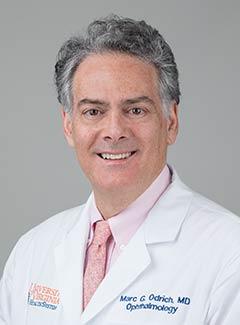
Marc G Odrich, MD
Ophthalmology
Additional Locations
Bio & Overview
Marc Odrich, MD, is a clinical ophthalmologist specializing in refractive surgery to correct conditions such as nearsightedness, farsightedness and astigmatism. In his previous roles as medical director and consultant for surgical technology companies, he’s played a pivotal role in the development and commercialization of the excimer laser and the femto laser. He continues to share his knowledge as a consultant working with multiple companies to advance corneal and refractive surgery, presbyopia correction and dry eye disease treatment.
A New York native, Odrich is a graduate of Columbia College and received his medical degree from Columbia University College of Physicians and Surgeons. He completed an internship in internal medicine at Yale’s Danbury Hospital before moving on to pursue his residency at Columbia’s Harkness Eye Institute. Odrich then went on to a two-year fellowship focused on cornea and external disease at Harvard’s Massachusetts Eye and Ear Infirmary.
Academic Information
- Gender
- Male
- Languages
- English
- Age Groups Seen
- Adults (21-65)
Older Adults (65+)
- Primary Education
- Columbia University College of Physicians and Surgeons
- Residency
- Harkness Eye Institute, Columbia University
- Fellowships
- Massachusetts Eye and Ear Infirmary, Harvard University
- Certification
- American Board of Ophthalmology (Ophthalmology)
Highlights
Dr. Marc Odrich Video Profile
My name is Marc Odrich, and I'm an ophthalmologist. I'm a corneal and refractive surgeon, and I spend time treating diseases of the front surface of the eye, the cornea. And then I have a subspecialty interest in refractive surgery. Refractive surgery is the surgery that we use to get rid of glasses and contact lenses. I spend a fair amount of my practice looking at people who have had prior surgery and need to have certain things fixed or touched up, and understanding the complex human optical pathway and how it can be bettered by laser surgery. Patients will come in after meeting the staff. We take them through a series of tests. The tests are computer-based images of the eye. Some of them are the actual surface of the eye where I would do the operating, and the other ones are the optics of the eye. What exactly is happening to light when it enters your eye? How is it bent? How is it made imperfect? And then, those machines will tell me what I need to do.
Awards
2019-2020 Best Doctors in America® List
Reviews
353 Patient Satisfaction Ratings
Our patient satisfaction ratings are an average of all the survey responses to the below questions a provider got within the past 2 years. To protect your privacy, patients aren't identified.
See more about our patient satisfaction surveys .